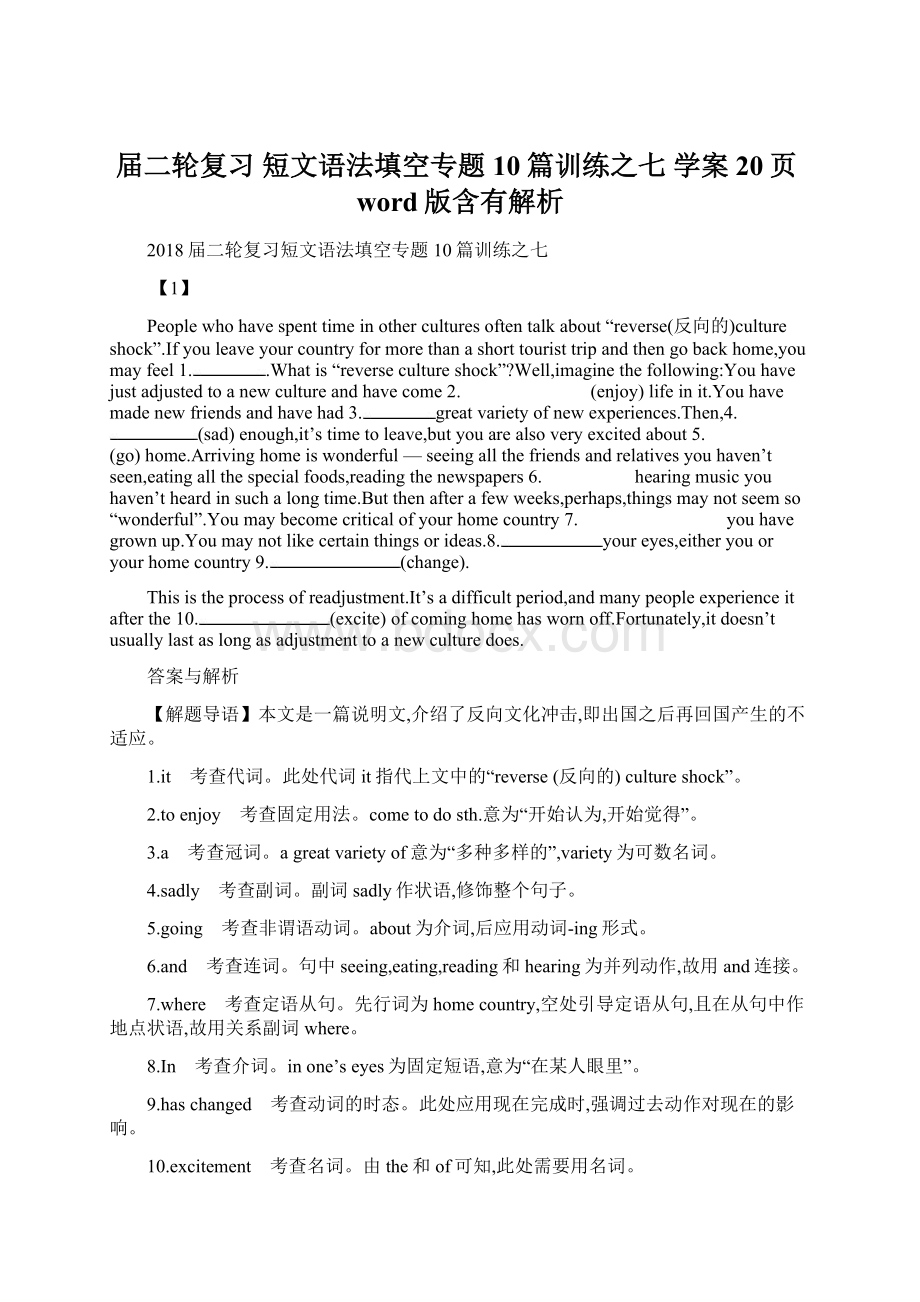届二轮复习 短文语法填空专题10篇训练之七 学案20页word版含有解析.docx
《届二轮复习 短文语法填空专题10篇训练之七 学案20页word版含有解析.docx》由会员分享,可在线阅读,更多相关《届二轮复习 短文语法填空专题10篇训练之七 学案20页word版含有解析.docx(10页珍藏版)》请在冰豆网上搜索。

届二轮复习短文语法填空专题10篇训练之七学案20页word版含有解析
2018届二轮复习短文语法填空专题10篇训练之七
【1】
Peoplewhohavespenttimeinotherculturesoftentalkabout“reverse(反向的)cultureshock”.Ifyouleaveyourcountryformorethanashorttouristtripandthengobackhome,youmayfeel1..Whatis“reversecultureshock”?
Well,imaginethefollowing:
Youhavejustadjustedtoanewcultureandhavecome2. (enjoy)lifeinit.Youhavemadenewfriendsandhavehad3.greatvarietyofnewexperiences.Then,4.(sad)enough,it’stimetoleave,butyouarealsoveryexcitedabout5. (go)home.Arrivinghomeiswonderful—seeingallthefriendsandrelativesyouhaven’tseen,eatingallthespecialfoods,readingthenewspapers6. hearingmusicyouhaven’theardinsuchalongtime.Butthenafterafewweeks,perhaps,thingsmaynotseemso“wonderful”.Youmaybecomecriticalofyourhomecountry7. youhavegrownup.Youmaynotlikecertainthingsorideas.8.youreyes,eitheryouoryourhomecountry9.(change).
Thisistheprocessofreadjustment.It’sadifficultperiod,andmanypeopleexperienceitafterthe10.(excite)ofcominghomehaswornoff.Fortunately,itdoesn’tusuallylastaslongasadjustmenttoanewculturedoes.
答案与解析
【解题导语】本文是一篇说明文,介绍了反向文化冲击,即出国之后再回国产生的不适应。
1.it 考查代词。
此处代词it指代上文中的“reverse(反向的)cultureshock”。
2.toenjoy 考查固定用法。
cometodosth.意为“开始认为,开始觉得”。
3.a 考查冠词。
agreatvarietyof意为“多种多样的”,variety为可数名词。
4.sadly 考查副词。
副词sadly作状语,修饰整个句子。
5.going 考查非谓语动词。
about为介词,后应用动词-ing形式。
6.and 考查连词。
句中seeing,eating,reading和hearing为并列动作,故用and连接。
7.where 考查定语从句。
先行词为homecountry,空处引导定语从句,且在从句中作地点状语,故用关系副词where。
8.In 考查介词。
inone’seyes为固定短语,意为“在某人眼里”。
9.haschanged 考查动词的时态。
此处应用现在完成时,强调过去动作对现在的影响。
10.excitement 考查名词。
由the和of可知,此处需要用名词。
【2】
Teaisconsumedaroundtheworldmorethananyotherdrinkexceptwater.OriginatinginChina,teahaslongestablished1.(it)asthenationaldrinkofthiscountry.
AcenturybeforethebirthofChrist,tea2.(describe)inChinesetextsasahealthdrinkthatmadeonelive3.(long).Today,itisstillbeingregardedassuch.Bothgreenteaandblackteaareclaimedtobeeffectivefor4.(prevent)cancer,heartdisease,andmanyotherdeadlydiseases.Thereisonlyonepoint5. peopleneedtobeawareofwhentheydrinktea—itshouldnotbedrunkalongwithmeals.
Tea,apopulardrinkinChinaandmanyothercountries,6.(be)carefullypreparedaccordingtolocalcustoms.TheChineseputlooseteainteapots,addboilingwater,andserveitinteacups.ThestrongteafromChina’sFujianProvinceisdrunkintinycupsbeforedinner.Lighterteawithjasmine(茉莉),roseorother7. (flower),usuallyservedafterdinner,isspecialtoChina’sChangjiangRiverregions.
ManyEnglishpeople,travellingawayfromhome,feel8.alossiftheirfavoriteteabagsarenotavailable.AfternoonteainEnglandisstillatime-honoredtradition.It’sagoodopportunityforpeopletosocializeordiscussbusinessmatters.
InJapan,ateaceremonyisoftenheldwhilepeoplearedrinkingtea.Theceremony,usually9. (hold)inateahouse,datesbacktothe16thcentury.Guestsfollowstrictrulessetupthenandtheteausedispowderedgreentea.Thoughstillpractisedtoday,theceremonymaynotbeaspopular10. itusedtobe.
答案与解析
【解题导语】本文是一篇说明文,主要介绍了茶的渊源及几个国家的茶文化。
1.itself 考查代词。
此处填的代词与句子主语tea形成互指关系,故用反身代词。
2.wasdescribed 考查动词时态和语态。
根据语境中的时间状语“AcenturybeforethebirthofChrist”可知,事情发生在过去,且tea和describe构成逻辑上的动宾关系,故用一般过去时的被动语态。
3.longer 考查比较级。
此处表示“让人活得更长”,故用longer。
4.preventing 考查动词-ing形式。
介词后跟名词、代词或动词-ing形式作宾语,故用preventing。
5.that 考查定语从句。
that引导定语从句,在从句中作介词of的宾语,修饰先行词onepoint。
6.is 考查主谓一致。
句子主语为Tea,且与下文的“isdrunk”在时态上呼应,故此处用一般现在时的第三人称单数形式。
7.flowers 考查名词复数。
flower是可数名词,由前面的other可知,此处表示复数概念。
8.at 考查介词。
固定搭配ataloss意为“困惑,不知所措”,故用介词at。
9.held 考查非谓语动词。
hold和句子谓语之间没有连词,故用非谓语动词。
句子主语Theceremony与hold构成逻辑上的动宾关系,故用过去分词形式。
10.as 考查连词。
由“as+形容词+as”的结构可知,此处应用连词as引导比较状语从句。
【3】
In1. (tradition)Chineseculture,taichiisoftenrelatedtotheChineseideaofyinandyang,theideathatonecanseetwosidesineverything.Once2.atime,TaoistZhangSanfengsawabirdattackingasnakeintheWudangMountainsinHubeiProvince.Thesnake’sdefenseinspiredhim3.(create)asetof72movements,whichused4.(soft)andpowerfrominsidetodefeatviolentforce.
Forthose5. doit,taichicanbepracticedanytimeandanywherewithoutequipmentoragymnasium.Andlearningtodoit6. (correct)givesusapracticalwaytoachievesuchthingsasbalance,motorcontrolandrhythm(节奏)ofmovement.Soit7.(believe)thatpracticingtaichicaninsomewayhelpusstand,walk,moveandrunbetter.
Taichi’sbenefitscertainlygobeyondphysicalones.ForMarleniCalcinafromPeru,who8. (do)taichiforover10years,it’snotonlyasport,butalsoawayoflife.And9.istaichithathashelpedherunderstandthevalueof“goingslowly”.Now,practicingtaichiislike10. (speak)withhersou